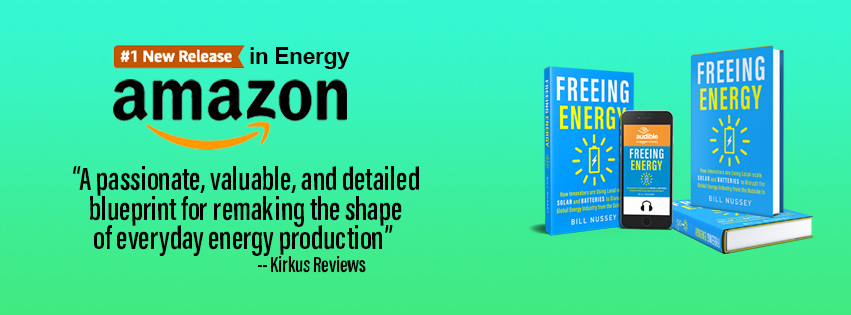Hello to all of the friends of Freeing Energy!
My letter this month is a bit longer than usual but a recent article in the Wall Street Journal about net metering demands a response. If you are here just to read the news, keep reading below. But I urge you to read the full letter here.
Bill Nussey
Founder and CEO of Freeing Energy
Clean Energy Headlines
Florida House offers compromise to more rooftop solar users. Florida has the second-largest solar workforce in the county, with approximately 11,000 direct jobs and 31,000 indirect ones according to the Solar Industries Association. However, the proposed House Bill 741 would significantly reduce financial incentives and charge additional fees to the 90,000 Florida customers selling excess solar energy back to the grid. The bill, which was written by lobbyists for Florida Power & Light, was passed by a bipartisan committee on a 13-3 vote. Now on the House floor, the bill has received greater opposition, but proponents of the bill have offered an amendment that would enable current solar users to retain their incentives for 20 years rather than the originally proposed 10. (Tampa Bay Times)
The nation’s largest grid operator seeks a two-year pause on approvals. PJM Interconnection is so clogged with requests from developers looking to connect to its regional transmission network that it has proposed a two-year pause on reviewing energy projects, most of which are solar power. And current projects may have to wait until 2027 before they are approved and can even begin construction. The cause of the clog can be explained in part by the increasing economic competitiveness of solar power, and a booming renewable energy industry driven by state energy policies and corporate sustainability plans. (Inside Climate News)
Ruling on rooftop solar called “game-changer” for clean energy. When the Arizona power utility Salt River Project hit solar customers with a 65% electricity hike in 2015, rooftop solar applications fell precipitously. But in a recent ruling, a federal court has said that utilities can be prosecuted under antitrust laws for attacking local energy solutions like rooftop solar. In its ruling in Ellis v. Salt River Project, the Ninth Circuit Court of Appeals agreed with the plaintiff that SRP’s pricing scheme “unlawfully discriminated against customers with solar energy systems and was designed to stifle competition in the electricity market.” (Common Dreams)

$5 trillion dollars invested in fossil fuel subsidies. It’s a common mistake to think that only renewable energy is subsidized when in reality governments around the world pour nearly half a trillion dollars into fossil fuel subsidies each year. Since 2010, governments have spent a combined total of more than $5 trillion in fossil fuel consumption subsidies, with oil accounting for 43% or over $2 trillion of all the subsidies. By artificially suppressing prices, governments often encourage the overconsumption of carbon-intense fuels, which siphons money away from cheaper, cleaner renewable energy solutions. (Energy Shift)
Electric cars could become charging stations too. One of the greatest obstacles to EV adoption today is a lack of charging infrastructure. However, in the near future, most EVs will have “bidirectional” or two-way batteries. This will make your car a potential source of power for your home, worksite- or even another car. Within the last year, Ford Motor released an electric and hybrid version of the popular F-150, with the innovative feature that it can “share” miles with other EVs by transferring power between car batteries. These batteries could eliminate range anxiety and help people rethink destination charging. (Axios)
EPA cracks down on dangerous coal ash storage ponds. The Environmental Protection Agency has ordered utilities to stop dumping waste into unlined storage ponds and to close leaking coal ash sites that contaminate streams, lakes, and underground aquifers. As a result, plants in four states will have to close coal ash ponds months or years ahead of schedule. These actions mark the first time the EPA has taken steps towards enforcing a 2015 rule aimed at reducing groundwater pollution by coal power plants, which produce 100 million tons of ash and other waste in the US each year. (AP News)
Latest Podcast Episodes
Podcast 077: Michael Barnard: Nuclear, Solar, Wind, Hydrogen, Batteries? This Expert Predicts The Winners And The Losers.

Host Bill Nussey catches up with the global energy thought leader, strategist, business advisor, and founder of The Future Is Electric, Michael Barnard. Barnard shares his positive, pragmatic, and colorful views on a range of clean energy technologies and which ones he would place his bets on in the global race to a clean and affordable energy future. (Listen Here)
Podcast 076: Tim Echols: How Does This Georgia Public Service Commissioner See Net Metering And Its Future.

In this episode, host Bill Nussey catches up with two term Georgia Public Service Commissioner, Tim Echols, for a very timely discussion. Echols breaks down the important role played by the public service commission. He shares his part in promoting net metering in Georgia, and the valuable lessons learned from other states wrestling with this important market mechanism in the transition to local renewable energy. (Listen Here)
Subscribe to follow us on popular podcast platforms:
Freeing Energy Is Now A Book… It Hits #1 On Amazon’s New Releases In Energy

After four years, six countries, 320 interviews, and almost 400 endnotes, the Freeing Energy book launched this past December 2021. It’s available in Kindle, paperback, hardcover, e-book, and audiobook versions from Amazon and most other book sellers.
For more information on the book…
- Book site: http://FreeingEnergybook.com
- Amazon: https://www.amazon.com/dp/1732544646/
- Kobo: https://www.kobo.com/us/en/ebook/freeing-energy






